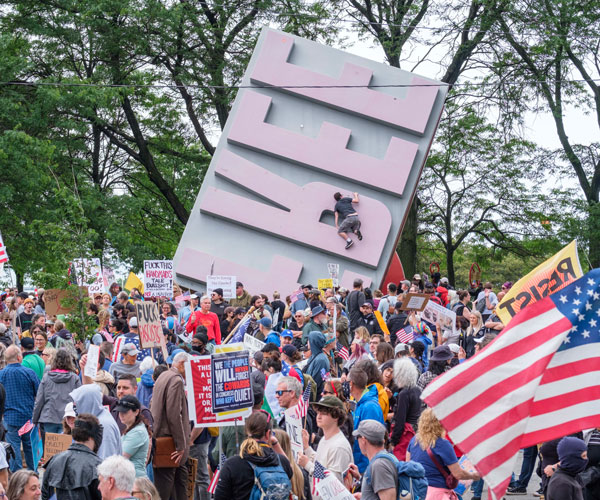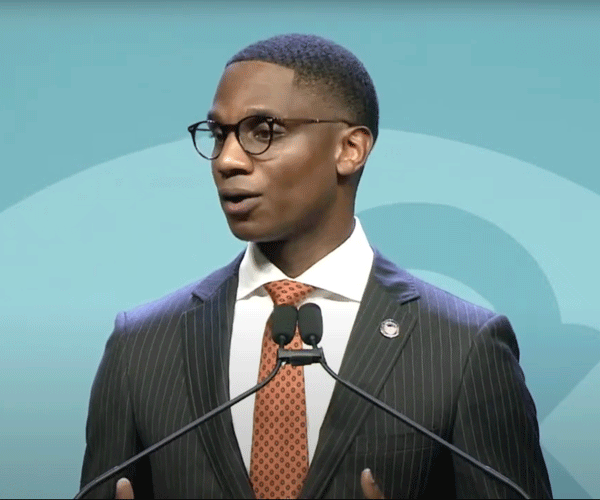As Jeff Johnson walks into Angela's Family Restaurant on St. Clair Avenue, the sleepy diner wakes up. The waitresses call out greetings and swing into orbit around him as he takes a seat. It's two days after Johnson won Cleveland City Council's hottest race, a seat in Ward 10, and Michael Kontos, co-owner of Angela's, congratulates him.
"So, I'm still your councilman," Johnson says. "You've got to put up with me for four more years!"
"And then you're going to be mayor," Kontos says.
"Well, we'll see about that!" Johnson replies.
It's been a long time since Johnson has heard encouragement like that, much longer than he would've expected in the 1980s. Back then, he was City Hall's charismatic, aggressive rookie upstart who stood up to George Forbes and provoked the imperious City Council president to swing a chair at him.
Sixteen years ago, an FBI sting and an extortion conviction seemed to end Johnson's career. But since then, he's pulled off Cleveland's biggest political comeback since Dennis Kucinich went to Congress. He was elected to City Council again in 2009. And this fall, he leaped over ruthlessly gerrymandered new ward lines, ran against a fellow councilman favored by City Hall leaders and won with 57 percent of the vote. It's like the 1980s all over again: Johnson, now 55, is once again an independent force on City Council, defying its leadership, demanding more for the Glenville neighborhood and outfoxing rivals' attempts to knock him down.
He even looks like he did in his 20s: dark hair, mustache, sharp thin face, hazel eyes. A handsome man, Johnson once dated actress Halle Berry. But he's different than when he first arrived at City Hall.
"I know more. I was 26 back then. And when I came in here at the age of 51, I had more experience. I'm also more confident, less arrogant and now less concerned about where I'm going." He used to fear his rivals would derail his career, he says. He doesn't anymore. No surprise from someone who survived a near-death career experience.
Johnson was running for Congress in 1998 when he was charged with extortion. The FBI caught him on tape demanding campaign contributions from a grocer in exchange for help with state business. He lost the election, lost the trial, lost his state Senate seat, lost his freedom. He served a 15-month sentence. Talking about the case now, he treads carefully, admitting to violations of the law but not criminal intent. He says he now counsels other politicians on how not to run afoul of the Hobbs Act, the federal anti-corruption statute.
"When I go to someone to talk about fundraising for an election, I never discuss business," he says. "You want to talk about something you need, we're going to have to talk another day. One does not have something to do with the other." After 10 minutes of talking about the case, his head is in his hands.
If Johnson bears scars, so does his neighborhood. His job is tougher now — "more poverty, more things associated with poverty, such as the results of the housing crisis, the removal of investment over the years from our commercial strips, and just populations leaving."
Johnson has challenged Cleveland and Cuyahoga County's demolition-first strategy for the city's thousands of vacant homes. He's taken up a daunting cause: finding money and buyers to rehabilitate the best homes in his ward or mothballing them until a market develops.
"The housing in Glenville and parts of Collinwood, you lose that house and you'll never be able to rebuild something like that again — beautiful woodwork inside, a lot of house for your money," he says. "I don't want a third of Glenville torn down during this enthusiasm."
This fall, Johnson ran for council in the long, thin new Ward 10, which snakes along St. Clair Avenue from AsiaTown to South Collinwood. It was drawn to favor councilman Eugene Miller. To beat him, Johnson allied with councilmen Kevin Conwell and Mike Polensek, who vouched for him in neighborhoods they used to represent.
Now they want to create a single strategy to redevelop Cleveland's northeast side. The three also voted against Mayor Frank Jackson's $30 million agreement with the Browns to renovate FirstEnergy Stadium. Their work across ward lines is rare for Cleveland, where council members act like mini-mayors. It could also give Johnson a platform for the ultimate comeback move — running for mayor when Jackson retires.
"If somebody asks me, 'Would you like to be mayor of Cleveland?' I tell them, 'Yes, I would,' " he says. "I have something to contribute. ... The best thing I can do is do a good job in Ward 10 [and] be rewarded with serious consideration."



